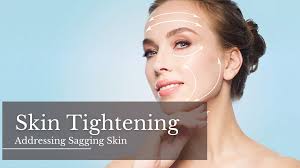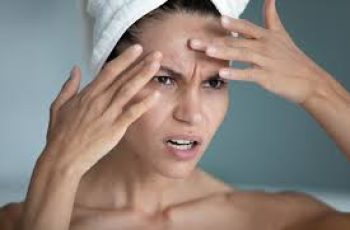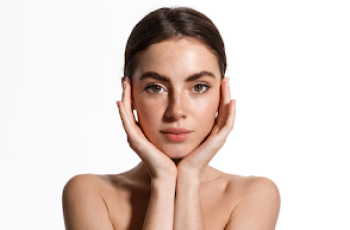How to Tighten Sagging Skin on Face?
It’s funny how as soon as soon as you come to terms with the fine lines and wrinkles that develop on your skin over time, skin sagging begins to make an appearance. When it comes to skin sagging however, there is often a lot of confusion about which routine or treatment is the best way to go about combating and potentially reversing the signs of skin sagging. So, this is why today I will be focusing on finding out more and sharing with you the best tips I have found and answer your concerns about how to tighten sagging skin on the face.
Before I do that though, let’s first find out why it occurs in the first place:
Why do I have sagging skin on my face?
First of all, there is the breakdown of collagen and elastin production in the skin. As we age this process slows down resulting in the skin beginning to show the signs of sagging which often starts on the jaw line and cheek area often revered to a ‘jowls’.
UV exposure has a lot to answer for when it comes to skin slacking. Damage caused by free radicals from the sun not only breakdown existing collagen with the activation of enzymes, but also prevents the development of new collagen being produced, overall finishing with a loss of firmness to the skin.
You may also find that as we age, we often lose facial fat which over time results in the face looking sallow and drooped.
Lack of a skincare routine can also lead to the skin ageing a lot quicker than expected, even a simple routine will help slow down any signs of ageing.
Lifestyle choices also play a factor in skin ageing, habits such as smoking, excessive drinking or use of sun beds can age the skin more rapidly.
Now that you have a better understanding of how the skin begins to sag and the reasons for it, I will now share with you some advice on ways of treating and preventing it at home and through the help of trained professionals.
How can I tighten loose skin on my face?
There are a couple different routes you can take when tightening loose skin. Let me start by sharing with you the simplest ways which is using daily facial massages, which have grown a lot in popularity in recent months. These massages are developed to exercise the facial muscles that are under the skin, although we use them constantly to talk and show thousands of different expressions, we rarely exercise them in a way that will tone the skin and help it becoming firmer. There are many different tools available and various techniques you can find on social media and YouTube, if you decide to give facial massaging a go, to reap the rewards it is best to consistently use them for more than two weeks, that will give enough time to see a marked improvement.
Another way of tightening loose skin on the face is to try popular skin treatments such as radiofrequency and ultrasound devices. Both methods provide impressive results by promoting the production of collagen with minimal discomfort and super quick recovery time. The side effects that you can expect to suffer from are redness, swelling and some numbness after the treatment but soon wear off, something to remember if you find yourself considering plastic surgery to combat skin sagging with a face lift. Many practitioners have shared that they are suggesting leaving surgery as the very last option, instead opting for the two treatments previously mentioned.
Can you reverse sagging skin on face?
Yes you can! When it comes to skin ageing, we find that prevention plays a vital role. It is never too late to start using skincare products or specific ingredients and methods, as long as you start using any of these you will find there is a significant improvement of the appearance of your skin and the overall look of the complexion. By introducing a potent active skin ingredient or begin using a massaging tool, you are taking the first steps into reversing any sagging skin, particularly in the jaw and cheek area.
Here are some life swaps to make if you are wanting to prevent skin sagging:
Applying a daily SPF of 30 and higher, even on overcast days will product the skin from harmful free radical damage and the breakdown of collagen
Avoid smoking and going on sun beds
Drink enough water throughout the day
Ensure you fully cleanse the skin at the end of the day to rid it of any leftover makeup products
Use a skincare routine containing high performing and potent ingredients
You can also reverse any skin sagging with skincare advice that has already been shared, don’t forget you can find out more about combating the signs of skin ageing in our blog post about the top 5 most effective anti-ageing ingredients.
How can I increase collagen in my face?
There are many different ways of boosting collagen levels in the skin which are easily achieved from topical ingredients, supplements and diet.
Hyaluronic Acid- an important compound for collagen in the skin and can be found in different foods, supplements and in a lot of skincare products. It also contains humectant properties meaning it is able to lock moisture into the skin and help keep the face hydrated and looking youthful.
Vitamin C- a potent antioxidant that is able to combat any free radicals and prevent any skin damaged caused from exposure to UV rays, pollution, central heating and other environmental aggressors
Retinol- praised for its ability to increase the lifespan of collagen in the skin and is able to block the enzymes that develop from free radicals and break down collagen.
To ensure these powerhouse ingredients can deliver the best results, it is best to opt for a serum formula. This is due to the fact that, unlike moisturisers, serums are able to reach further down into the lower layers of the skin and reach the area collagen in produced.
I hope that there have been some answers to your concern about skin sagging today, don’t forget you can always head over to our Instagram for more skincare advice, new product launches and weekly giveaways
DQH Knowledge drop: In your 20s, your skin cell turnover decreases. (Cell turnover is a key component in keeping your skin youthful.) You know what else slows down? Your collagen production. Starting in your 20s, collagen decreases by about 1 percent per year. Should you want to prevent fine lines and wrinkles, start by eliminating behaviors that contribute to premature aging. “If it’s bad for you, it’s bad for your skin,” says dermatologist Michel Somenek.
“Cigarette smoking reduces blood flow to the skin and causes premature wrinkling and a dull skin texture. Making the repeated pursed motion to inhale can also cause smoker’s lines. Alcohol and recreational drugs are toxins for the skin that damage its cellular structure and DNA,” Somenek tells us. “The faster you eliminate vices while you are young, the better chance your skin and body have to recuperate.” Also, adopting an anti-aging routine in your 20s is key. After all, the best offense is a good defense. We spoke to Somenek and experts Joshua Ross and Audrey Kunin to find out more.
Keep reading for the best anti-aging products for your 20s, according to skincare professionals.
Sunscreen
“We all know that the sun is the number one cause of skin aging and starting the prevention in your 20s is very important,” Ross says. “The majority of your sun damage won’t start to appear until you’re in your 30s, so don’t wait until you see it surface or you’ll be behind the curve. Stay ahead of it with a good-quality zinc-based sunscreen worn daily.”
Farmacy Green Defense Daily Mineral Sunscreen
An invisible sunscreen with SPF 30, plus botanical extracts meant to protect skin with tons of antioxidants. Bonus: It’s clean and fine to use under makeup.
Bareminerals Complexion Rescue™ Tinted Moisturizer Broad Spectrum SPF 30
Although we recommend you use your SPF and moisturizer separately, we also understand moments when you don’t have time or energy for that extra step. For those times, this bareMinerals moisturizer is a great thing to have on hand.
Vitamin C Serum
“A great introduction to anti-aging is to start with a vitamin C serum in your morning skincare routine,” Ross says. “It’s a powerful antioxidant that will neutralize free radicals and brighten the skin.” He adds that it’s a great way to counteract the effects of the sun’s harmful rays, which, as previously mentioned, are among the biggest causes of premature aging.
Drunk Elephant C-Firma™ Vitamin C Day Serum
The Drunk Elephant C-Firma is a lightweight serum that promises to give skin a glow by combining the brightening powers of vitamin C with ferulic acid, l-ascorbic acid, and vitamin E. The included sodium hyaluronate is meant to replace hydration loss, so you shouldn’t have to deal with any irritation.
Sunday Riley C.E.O. Rapid Flash Brightening Serum
This potent serum is jam-packed with vitamin C (15 percent, to be exact), which means it’s a potential superstar at both brightening skin and dousing it in antioxidants.
Peptides
Using peptides on your skin has many benefits, says Somenek. “The skin barrier is what defends the body against pollution, UV rays, bacteria, and toxins. It can be damaged by several everyday factors. Using topical peptides aids in building a stronger barrier,” he says. “Peptides comprise elastic fibers, which are a type of protein. These fibers help to make skin appear taut and firm. Peptides can also help repair damaged skin, relieve inflammation, and even out skin tone. Some peptides can kill acne-causing bacteria that is common in 20-somethings.”
Kunin agrees, saying, “Peptides are an excellent entry point for supporting collagen.” She recommends looking for face and eye treatments that contain these collagen-boosting powerhouses.
Charlotte Tilbury Magic Eye Rescue Cream
This Charlotte Tilbury super-emollient eye cream has a base of coconut oil and shea butter (read: it’s incredibly hydrating). Botanicals plus peptides are meant to help reduce dark circles and boost collagen, respectively.
This creamy moisturizer serves up potent collagen-boosting peptides and pycnogenol, and antioxidant-rich vitamin C. “Instead of sitting on top of the skin, peptides penetrate the outer layer so they go deep. The ‘signals’ they send tell the cells to produce elastin and collagen, which are needed for youthful-looking skin,” explains Somenek.
At-Home Peel Pads
Remember that skin cell turnover fiasco we talked about earlier? One way to help support it is by exfoliating. “Exfoliation is important to help keep skin fresh and luminous,” Kunin says. She recommends using at-home peel pads as an easy and effective way to exfoliate.
“The goal in your 20s is to fight the slowing pace of cell turnover. It is wise to use products that gently exfoliate, yet still remove oil and other impurities. Products that have Alpha Hydroxy Acids (AHA) or Beta Hydroxy Acids (BHA) are a good choice.”
According to Somenek, you should only exfoliate two to three times a week. “People of all ages are guilty of over-exfoliating and that can be too much of a good thing,” he says.
Dermadoctor Kakadu C Intensive Vitamin C Peel Pad
A few swipes of this Derma Doctor powerful peel pad promise to leave your skin glowing and smooth, thanks to the seven (yes, seven) types of chemical exfoliants, including AHA and BHA. It also contains vitamin C via Kakadu plum extract for added brightening and antioxidant protection.
KEY INGREDIENTS Kakadu plum extract is sourced from the Kakadu plum, a fruit grown in northern Australia. It contains vitamin C, which restores the skin’s natural barrier, increases collagen production, and soothes irritation.
Dr. Dennis Gross Skincare Alpha Beta® Universal Daily Peel Pads
These are the gold standard of peel pads, with a cult following and over 900 five-star reviews on Sephora. They’re easy to use and contain a blend of anti-aging exfoliating acids.
Emollient Night Cream
“In your 20s, you need to start upping the hydration in your skincare routine. You may have been cautious of over-moisturizing because of acne in your teens, but as you enter your 20s, your skin transitions and becomes drier,” Ross says. “I recommend an emollient night cream added into your evening skincare regimen.”
“Twenty-somethings need to make sure that they are not using creams that will clog their pores and cause excess oil production,” says Somenek. Opt for non-comedogenic products.
Cerave Skin Renewing Night Cream
One great choice is the CeraVe Skin Renewing Night Cream, which is a non-comedogenic night cream that leaves skin soft and glowy. It combines the moisturizing powers of ceramides and hyaluronic acid.
RoC Retinol Correxion Max Hydration Creme
“The best night cream ingredients contain retinol, benzoyl peroxide, and/or salicylic acid or hyaluronic acid. The goal is to moisturize, yet remove excess oil,” says Somenek. This Roc Retinol Correxion cream fits the bill as it contains both hyaluronic acid and retinol so it promises to moisturize while also being non-comedogenic.



